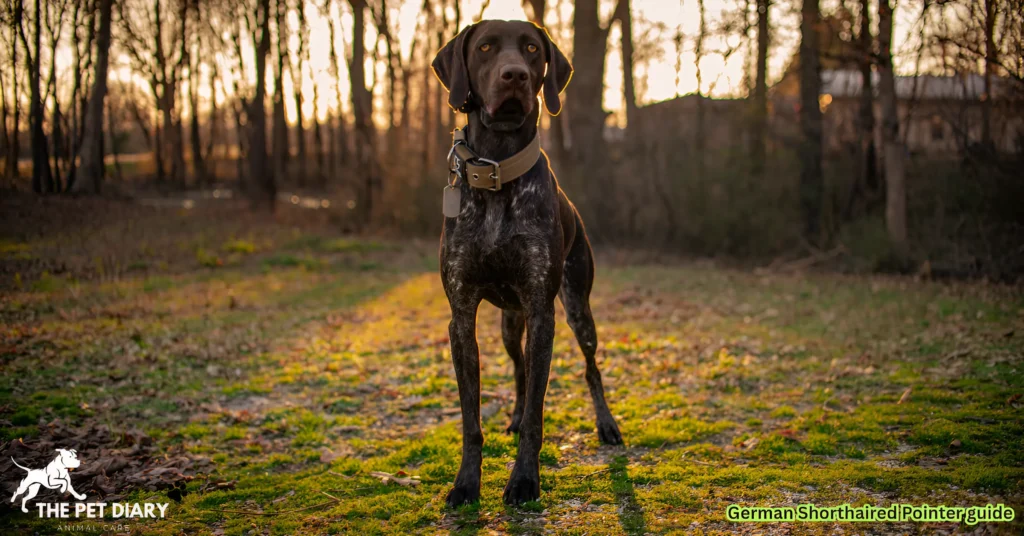German Shorthaired Pointer Guide: The German Shorthaired Pointer, often called the GSP, is a medium-to-large sporting breed originating in Germany. With its slender body, short coat, floppy ears, and distinctive liver-brown coloring, this breed is as striking as it is versatile. Known for being intelligent, athletic, and amiable, the GSP has all the qualities that make it a beloved companion and a popular choice among dog enthusiasts.
Understanding a proper German Shorthaired Pointer guide is important because a GSP is the ideal hunting companion, in addition to being a great household dog. This pointer dog breed is attentive, amiable, and ideal for active persons and families. It is a great option for the field because it is both strong and nimble. Even though the GSP has a lot of energy to burn, you will have a smart, lifelong friend if you can keep up with this active dog.
Discover everything there is to know about German shorthaired pointers, including their history and maintenance requirements.
Breed Overview
Group: Sporting
Height: 23 to 25 inches (M); 21 to 23 inches (F)
Weight: 55 to 70 pounds (M); 45 to 60 pounds (F)
Coat: Short and thin
Coat Color: Liver and ticking, liver and white, liver roan, or solid liver
Life Span: 12 to 14 years
Temperament: Intelligent, companionable, active, bold, attentive
Hypoallergenic: No
Origin: Germany
Characteristics of the German Shorthaired Pointer
German shorthaired pointers pick things up quickly and like having a task to do. These dogs have an unwavering work ethic that must be translated into desired behaviors because they were bred to spend hours tracking, pointing, and recovering game with hunters.
GSPs have highly loving personalities while they are at home. This breed’s devoted nature and love of play make it a popular choice for households with older kids.
Plan to include your GSP in any activities you enjoy. Adopting this breed is ideal if you can take your dog outside regularly and spend a lot of time outside. They enjoy spending time with their families, but they also require a lot of exercise. They are known to be content, outgoing dogs when they get both. Insufficient exercise causes the GSP’s zeal to swiftly transform into harmful energy.
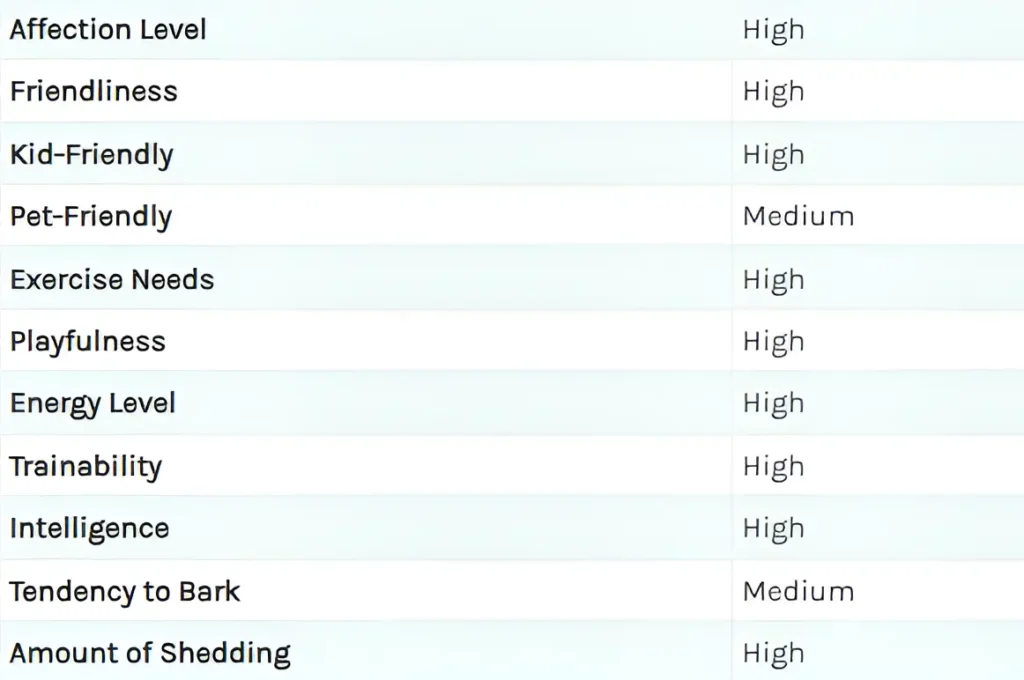
History of the German Shorthaired Pointer
The name of this breed of dog makes its country of origin quite evident. The German shorthaired pointer indeed originated in Germany during the 1800s. The goal of sport enthusiasts was to create a gun dog that was equally adept at hunting animals and retrieving birds. A friendly, trainable nature that would make the dog an easy companion as well as a capable partner was also crucial to the development of this adaptable dog.
It is believed that several hunting dog breeds in Germany and Europe were developed to optimize the GSP’s tracking, pointing, and retrieving skills. The shorthair hunting dog was a mix between the bloodhound, the now extinct German bird dog, and maybe English and Spanish pointing dogs. By 1870, a breed-specific studbook had been created.
The German Pointer is the name given to the breed outside of Bavaria. Sportsmen in the US and Europe soon realized that the dog might be used to hunt small animals or be a dream dog for duck hunters. Because they have webbed feet and an athletic, nimble body for collecting water, this species loves to swim.
Its popularity has persisted into the present era, ranking among the top 10 dog-like pointer breeds according to the AKC. Although sportsmen naturally choose these dogs, they are equally well-liked as energetic companions.
The German Shorthaired Club of America aims to produce a dog that is successful both in the field and the show ring. Known as a “dual champion,” the GSP excels in both competitions.
German Shorthaired Pointer Care Guide:
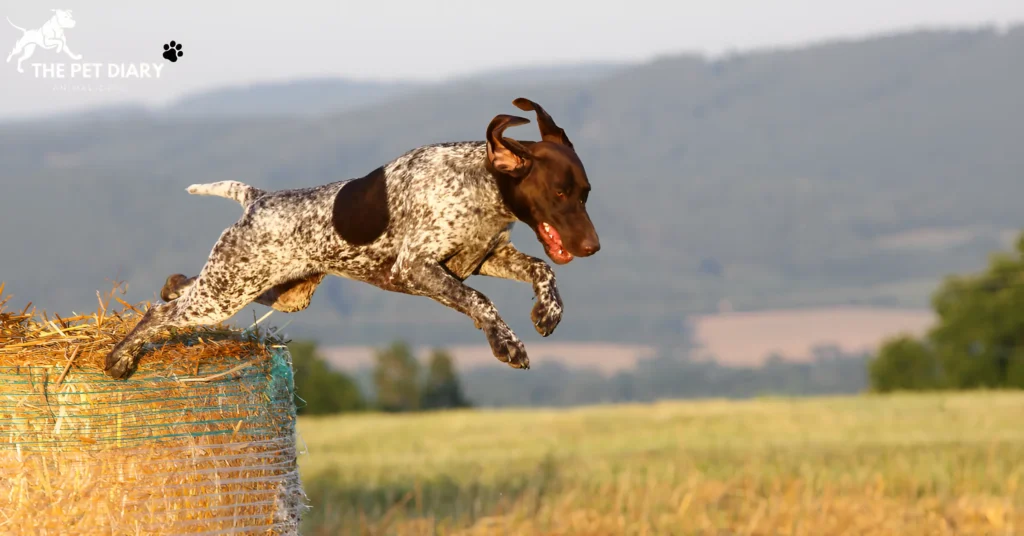
The German shorthaired pointer just needs the bare minimum of maintenance because of its short coat. However, this breed may require a lot of upkeep from households that don’t frequently spend time outside exercising. Fortunately, these readily trainable dogs pick up desirable habits fast and are excellent partners for trying new things.
Exercise
Make sure your German shorthaired pointer gets at least two healthy workouts every day. It will take more than a short stroll around the block to get the right amount. These canines will be happier the more time you can provide them with mental and physical challenges.
This breed is a willing companion for anyone looking for a dog to go hiking, running, or on other excursions.
Additionally, they do exceptionally well in almost every dog sport, including agility, flyball, dock diving, rally, and field trials. Pointers will use their innate skills and agility to learn an activity of their choice.
Grooming
The GSP dog has a short, gritty coat that is somewhat thick. Grooming is simple and usually simply involves giving your dog a quick wash down with a grooming mitt and maybe a bath once in a while, especially if they discover an odor to roll in.
But be ready for consistent shedding. It is well known that the short-haired dog of the GSP sheds on clothing, floors, and furniture. Regularly brushing their teeth, checking and cleaning their ears, and cutting their nails is essential, just as with any other dog.
Training
These dogs were created to be people-oriented; therefore, they have a strong desire to please their owners. Encourage and foster this inclination by providing early and continuous obedience instruction. Your GSP will better grasp your expectations, and you’ll have a well-behaved, attentive dog.
The GSP’s nature is so entwined with the gun dog character that many GSP puppies will point on their own. The breed frequently naturally has a “pointed” foreleg, a depressed stance, and a focused stare. You will be happy with how easy it is to train this breed for hunting if you intend to adopt it.
These dogs may hunt cats or other small pets because of their intense prey drive, even though they usually get along well with people. This prey drive can impair your dog’s better judgment and result in crazy chases, even if the GSP is usually obedient when it comes to recalls. Use caution while exercising this breed off-leash; keep them in a well-fenced yard and use a leash when you’re in public.
Common Health Problems
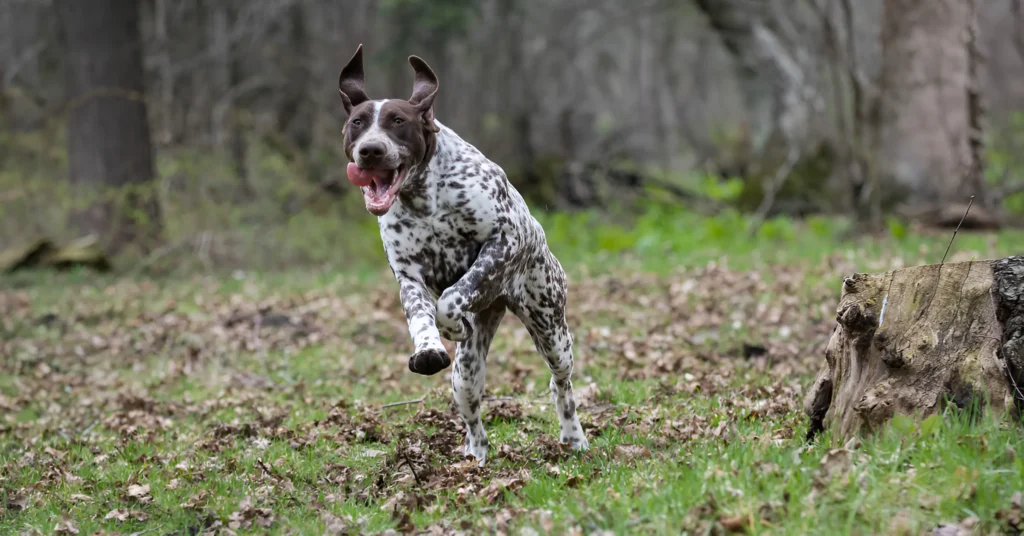
The GSP is a fairly robust breed, probably because of its genetically varied heritage. Although these dogs don’t commonly have health issues, their busy lifestyle may leave them vulnerable to harm. Nonetheless, a few hereditary disorders can still affect the German wirehaired pointer, such as:
- Hip and elbow dysplasia: Your dog may have discomfort when moving about due to these joint abnormalities, and in extreme situations, surgery may be necessary.
- Epilepsy: Seizures are a symptom of this neurological disorder. Treatment for moderate instances typically involves lifetime medication.
- Cancer (including canine hemangiosarcoma): If cancer treatment is delayed, the aberrant cell development it causes might be fatal. For information on conducting preventative testing to identify this illness before it worsens, speak with your veterinarian.
- Addison’s disease: This condition affects the adrenal glands in your dog and stops them from making vital hormones that keep the body’s electrolyte balance in check.
- Progressive retinal atrophy: Blindness eventually results from this retinal disease in your dog.
- Lyme disease: Although the disease is not hereditary, the GSP’s outdoor lifestyle makes it more susceptible to tick-borne infection. For prevention, follow a dependable flea and tick program.
Diet and Nutrition
German shorthaired pointer sc are adept at stimulating their appetites. This energetic dog breed won’t require much encouragement to eat, but be sure to choose a high-protein, high-quality food that will satisfy your GSP’s dietary requirements. To develop a portion plan that fits your dog’s age, weight, and activity level, see your veterinarian.
Avoid overfeeding these dogs and give them treats sparingly to preserve their athleticism and ensure a long, healthy life. Be mindful that pointers can occasionally be impacted by bloat, much like other big breeds. Try to limit your dog’s running or other high-intensity activities right after meals and discourage them from gorging on their food.
Where to Get a German Shorthaired Pointer or Adopt One
Are you trying to find your own GSP? Depending on their lineage and availability, German shorthaired pointer puppy may cost more than the usual $500 to $1,500 range.
Start your search by contacting any rescue groups that may be present in your locality. For some people or families, this adorable breed can be too energetic, yet it can be the perfect fit for you!
Do your homework before looking for a German shorthaired pointer breeder. Although it’s easy to obtain pups due to this dog’s popularity, it’s crucial to choose a trustworthy GSP breeder. Make sure the breeder has unambiguous hip, elbow, and eye test results, and request to meet one or both of the litter’s parents.
German Shorthaired Pointer Overview
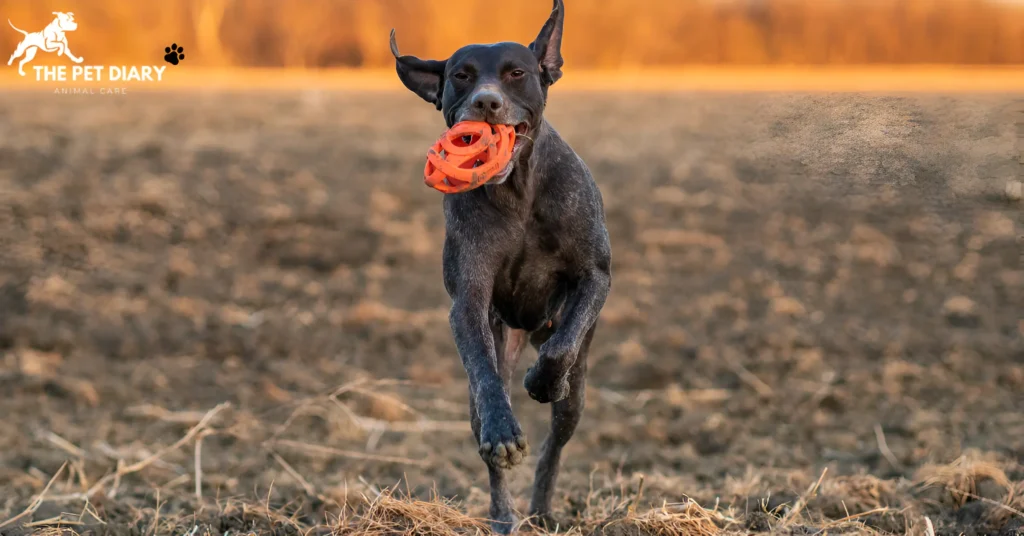
For busy families and hunters, the German shorthaired pointer is an excellent choice. Although these dogs are loyal friends and may be a lot of fun, their high hunting drive probably makes them inappropriate for homes with other pets like cats and pocket pets.
🐾Pros
- Friendly and affectionate
- Eager to please
- Excellent swimmers
🐾Cons
- Extreme energy
- May have a strong prey drive
- Considerable shedding
More Dog Breeds and Further Research
Living a happy life with a GSP requires understanding the commitment before bringing your four-legged friend home. Like any dog, pointers need to be trained, patient, and given the right care. But kids also need a lot of physical activity. Be realistic about the amount of labor and enjoyment that come with owning an active athletic dog.
These comparable athletic breeds could be of interest to you if you’re considering the German shorthaired pointer:
- Pointer
- Vizsla
- Chesapeake Bay Retriever
Numerous dog breeds are available to fit a variety of families and lifestyles. You can discover your next best buddy with a little investigation!
✨Conclusion of German Shorthaired Pointer Guide:✨
The German Shorthaired Pointer is more than just a hunting dog; it’s a loyal, energetic, and affectionate companion that thrives alongside active families. With their sharp intelligence, boundless energy, and eager-to-please nature, GSPs shine both in the field and at home.
If you’re ready to commit to their exercise, training, and care needs, this breed will reward you with years of adventure, love, and companionship. Whether running through fields, joining you on hikes, or curling up at the end of a long day, a GSP is not just a pet; it’s a lifelong partner. Learn more at ThePetDiary.com.
❓ FAQs of German Shorthaired Pointer Guide:
1. Are German Shorthaired Pointers good family dogs?
-
Yes, GSPs are affectionate and loyal, making them great family pets. However, they do best with active families who can meet their high exercise needs.
2. Do German Shorthaired Pointers shed a lot?
-
Yes, they shed year-round. Regular brushing can help manage their short, dense coat.
3. How much exercise does a German Shorthaired Pointer need?
-
They need at least 1–2 hours of vigorous exercise daily, including running, hiking, or canine sports.
4. Are GSPs easy to train?
-
Yes, they are intelligent and eager to please, but they require consistency and early training to channel their energy positively.
5. Do German Shorthaired Pointers get along with other pets?
-
They can, but due to their strong prey drive, they may chase smaller pets like cats or rabbits. Proper training and supervision are important.
6. How long do German Shorthaired Pointers live?
-
Their average lifespan is 12 to 14 years, with proper care, nutrition, and exercise.
7. Can you use human toothpaste for dogs?
- No, you should never use human toothpaste for dogs. Human toothpaste contains ingredients like fluoride and xylitol, which are toxic to dogs and can cause serious health problems if swallowed. Instead, always use a toothpaste specifically formulated for dogs. It’s safe to swallow and comes in flavors pets usually enjoy, like chicken or peanut butter.
